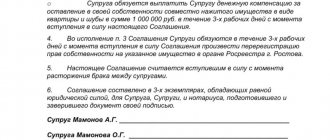Art. 23 of the RF IC establishes that the husband and wife at the stage of termination of marriage are entitled to sign a settlement agreement on divorce. Art. 15 of the Civil Code of the Russian Federation allows property disputes to be resolved by a notarial agreement. The Civil Procedure Code gives judges of general jurisdiction the right to accept an agreement or refuse to execute it. Some essential nuances of drawing up a settlement agreement, validity period, legal force and consequences are defined in the articles of Federal Law No. 127 of October 25, 2002 “On Bankruptcy”.
What is a settlement agreement?
Content
A settlement agreement is a bilateral document signed by a husband and wife (guardian/legal representative of the incapacitated spouse) that resolves disputed issues by seeking a mutually beneficial compromise. The following principles of document design should be taken into account:
- drawn up during the divorce process or after its completion (division of property of the spouses);
- subject to notarial approval;
- signed only by mutual consent;
- has the highest legal force;
- may concern only certain controversial issues (unaccounted issues will be resolved by the court at its own discretion);
- validity period – full fulfillment of the stipulated conditions by the participants;
- implementation of the agreement begins only after its acceptance by the court.
A couple who has begun a divorce can include in the contents of a settlement agreement issues regarding children (alimony, establishment of guardianship, determination of place of residence, approval of a schedule of meetings with a separate spouse, alimony), property conflicts (division of common material assets), maintenance of a woman after divorce ( alimony, payments to an incapacitated spouse).
The agreement can only be signed with the mutual desire of both participants. Otherwise, the agreement will be declared invalid. It is necessary to strictly follow the procedure and follow the principles of protecting the interests of participants.
Pros and cons of a divorce settlement agreement
Table No. 1 “Advantages and disadvantages of the agreement”
| Behind | Against |
| Reducing the time frame for judicial review of disputes | Mutual search for compromise, when participants have to give in to each other |
| There is no need to involve lawyers and lawyers at the court hearing | There is no guarantee that the court will accept the terms of the agreement (there are few reasons for refusal) |
| Independent determination of ways to resolve conflicts that arise | There is a risk that the contract will be invalidated |
| Resolving a conflict peacefully prevents future disputes |
As practice shows, spouses avoid concluding an agreement, hoping that during the trial they will be able to extract much more from the second party. This is wrong. During the division of property, courts in 90% of cases distribute material assets in half, regardless of the presence of common minor children.
Children are handed over to the mother in 4 out of 5 controversial situations. The schedule of communication between a child and a parent living separately is drawn up based on the busyness of the participants, so this turns out to be too little.
Division methods
There are several ways to divide between spouses. More often they choose division through the courts, since they cannot figure it out on their own.
But this method has several nuances, so it is better to choose voluntary conflict resolution.
Voluntarily
Voluntary division involves an agreement between spouses to divide property in specific shares.
In this case, a document is concluded - an agreement:
- It states all property, name and characteristics.
- Then the person who receives the right of ownership and possession of this object is indicated.
- All this is certified by a notary.
Through the court
It is possible to divide jointly acquired property through the court.
An application is submitted to the district court at the place of registration of the defendant. Additionally accompanied by financial costs for state fees and assessment.
Certification of the agreement by a notary
The settlement agreement receives legal force only after it is signed by a notary. A couple can contact a public notary or a private office with the following documents:
- participants' passports;
- 3 originals of the contract;
- Marriage certificate;
- when resolving issues about children - a personal document of each child;
- when resolving property disputes - documents for material assets.
Notary's tasks:
- confirmation of the identity of each participant;
- checking the content for errors (legal, semantic, spelling);
- exclusion from the content of conditions that violate the law or the interests of participants;
- confirmation of the voluntariness of participation and the sanity of the participants;
- contract signing – approval;
- registration of the agreement in a single database.
Art. 333.24 of the Tax Code of the Russian Federation provides for the amount of state duty when using the services of a notary:
- resolution of property issues (property division agreement) - half a percent of the total assessment of material assets (300 - 20,000 rubles);
- 500 rub. – non-property transactions;
- 250 rub. – alimony;
- 500 rub. - marriage contract.
The price is set based on the number of issues being considered and is compensated by the parties to the settlement agreement in half. Each copy of the contract is paid separately.
Additionally, the parties need to pay the notary's costs for technical work (copies, forms). In total, the procedure can cost from 1,000 to 25,000 rubles (if there is a property dispute).
Settlement agreement for divorce: situations
The subject of the agreement is determined taking into account controversial issues. So, if we are talking about children together, then it is necessary to establish the place of residence and the features of the participation of each parent in the life of the child, alimony. The content of the agreement and its cost will depend on the number of controversial issues.
The judge may approve the contract in part, refusing to accept points that violate the law or the rights/interests of the participants.
Divorce and division of property
The agreement allows you to determine a special procedure for dividing common material assets, when the legal algorithm provides for the distribution of property in equal parts. The form of the agreement is only written with notarized approval.
The content should display the following information:
- a complete list of benefits, including personal ones, divided into categories;
- property assessment (one conclusion for each property being assessed);
- proposed algorithm for dividing property (even personal goods can be divided by agreement);
- indication of the shares of each child;
- conditions for registering property rights;
- consequences of violating the terms of the agreement.
Divorce and determining the place of residence of children
Article 24 of the Russian IC establishes that the accepted conditions must guarantee the interests of each participant in the process. If the rights of a child are violated, the judge is obliged to refuse to accept the settlement agreement.
The agreement must contain the following information:
- Indication of the child’s place of residence at the address of one of the parents. Write down the full address and ownership of the apartment. If the parent is not the owner, then it is additionally indicated that the owner of the property agrees to register the child as an apartment.
- Participation in education, accompanied by the determination of a meeting schedule. Additionally, the possibility of taking a joint vacation with a parent is indicated. The procedure for mutual agreement on the place of study and attendance at extracurricular activities.
- The purpose of alimony and the procedure for compensating it: in a fixed amount or as a percentage of income. In addition to monthly payments, alimony may be paid at other intervals or provided in exchange for large, expensive gifts (for example, real estate).
Divorce and division of debts
Art. 24 of the RF IC states that an agreement cannot be drawn up in relation to issues of debt obligations when the interests of third parties are affected. In this case, the court's actions will be as follows:
- refusal to accept the agreement;
- partial satisfaction of the settlement agreement;
- attracting a creditor, on whose opinion further division of debts depends.
According to the requirements of the Civil Procedure Code, if a divorce affects the interests of third parties, they must be present during the procedure.
Nuances of the division of real estate and business
The price of an apartment or house is quite high, so when dividing joint real estate, you need to specify in detail in the agreement all its details (cadastral number, other certificate data), and stipulate the deadline for registering the transfer of rights with the Rosreestr authorities. The notary's office will provide the service of sending an application to the registrar and receiving an extract from the state register for the new owner.
The simplest option is when the property is owned by the spouses and has no encumbrances.
A difficult situation also arises in the case of an apartment purchased with maternal capital. Its amount belongs equally to all family members, including children. When dividing property, their rights to a share of real estate must be preserved.
Spouses may divide shares or shares in a commercial enterprise, provided that this is permitted by the company's Charter. In this case, a situation may arise that there is a ban on the inclusion of new participants, or the alienation of a share requires the consent of other members of the company, and it has not been received. The issue can be resolved in two ways: reimburse the spouse for the cost of the allocated share in money; sell the business and divide the proceeds.
If the husband or wife are individual entrepreneurs, then the property acquired in the process of entrepreneurial activity is jointly acquired and can be divided.
Note. When dividing a business, it is necessary to take into account that the spouse who receives the assets also receives the debts of the enterprise attributable to his share. In such cases, it is necessary to carefully check all documents, which a notary will help to do.
Lawyer's answers to frequently asked questions
During the divorce, my wife and I drew up an agreement on child support; a few years later, the wife decided to file for alimony. Will a previously drawn up agreement play a role in court?
A settlement agreement on alimony is an executive document on the basis of which monthly maintenance is withheld. Additionally, there is no need to go to court. If the signed agreement states that the man is exempt from alimony, then the spouse can cancel the agreement and claim the money. The judge will make concessions to the woman, since the lack of child support obligations is a violation of the rights of children. The same applies to situations where payments are much less than the child’s subsistence level.
My husband and I drew up and signed a settlement agreement, but did not have it notarized. Does it have legal force in the event of future disputes?
No, the document comes into force only after notarization.
My husband and I drew up a peace agreement regarding communication with the child. A year later, he declares that the established time is not enough for him and he would like to see his son more and, if I do not give him such an opportunity, he will go to court. Does he have a chance of a positive result in court if there is a previously concluded agreement?
Yes, despite the existence of a settlement agreement, it is possible to subsequently consider controversial issues in court. The law states that changes to the agreement are possible only by mutual consent of the participants. If one of them later decides that his interests are limited to the document, he will be able to appeal it in court.
The parent has the right to communicate with the child (children have the right to communicate with the parent living separately), but the schedule is set taking into account the employment of each party to the process.
Can I challenge a previously drawn up settlement agreement if its contents no longer suit me?
Everything depends on conditions that are no longer satisfactory. If they violate your rights or limit your interests, then you can. If we are talking about monetary obligations that were not indexed and their amount is no longer sufficient, then the agreement can be canceled in court.
Is a settlement agreement required when dividing an apartment or can it be agreed upon orally?
It is enough for spouses to prepare documents and submit applications to Rosreestr in order to change property rights to the object. This is legal, but in the future the spouse who lost the property can appeal the decision. If an agreement cannot be reached, you need to go to court.
Is it necessary to pay a state fee in court if a settlement agreement has been concluded?
Yes, the state fee is paid for accepting the statement of claim and a percentage of the value of the claim (the price of the disputed property) is withheld.
What property is subject to division?
The basic rules that are taken into account when drawing up an agreement on the division of property with a notary are established by Art. 38, 39 RF IC, art. 252, 254 of the Civil Code of the Russian Federation. They are applied taking into account other norms of family, housing, and land legislation. Only common property acquired by the time the transaction is concluded is distributed between the parties.
- Real estate purchased during marriage using joint family funds (land, houses, apartments, garages).
- Real estate purchased with a mortgage (in this case, the mortgage loan outstanding at the time of the divorce or conclusion of the agreement is also subject to division).
- Financial funds in accounts, regardless of who they are registered in, income from labor and other activities.
- Movable items acquired during marriage (cars, furniture, collections), securities (including shares in LLCs, shares).
The following cannot be the subject of a separation agreement between spouses:
- real estate acquired, inherited, privatized by one of the spouses before marriage, received as a gift, registered in the name of children;
- personal belongings and items of use (clothing, phones, etc.), with the exception of jewelry and luxury items;
- money received by a family (one of its members) for its intended purpose (social benefits, maternity capital);
- bank deposits, insurance issued in the name of children.
It is advisable to draw up the agreement directly with the participation of a notary in order to avoid mistakes that may lead to the possibility of challenging it. In our notary office you can get advice and develop a legally competent document taking into account your specific family situation.







